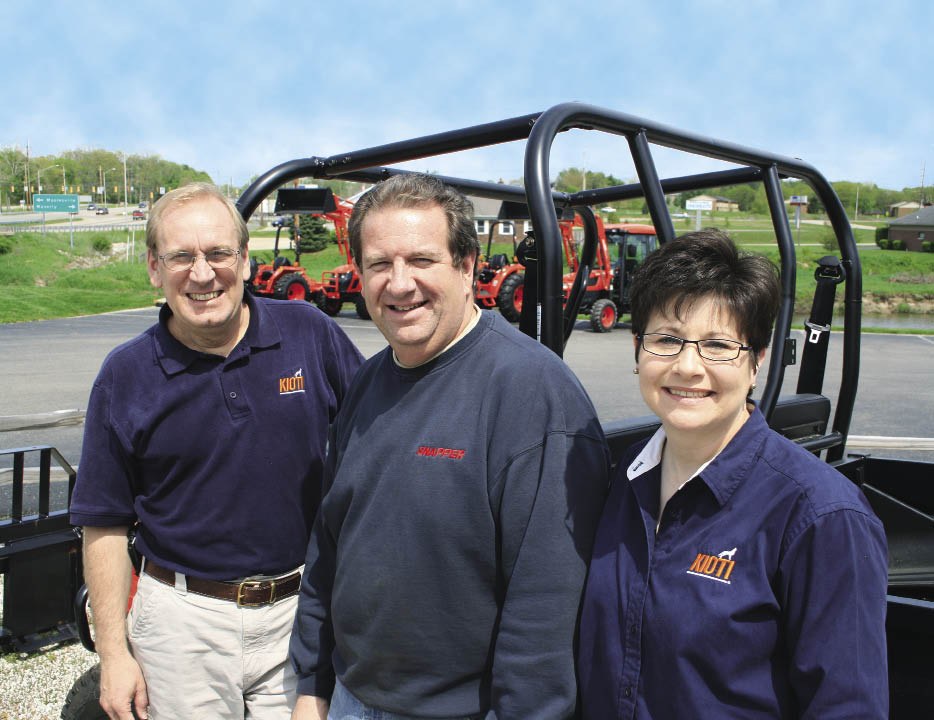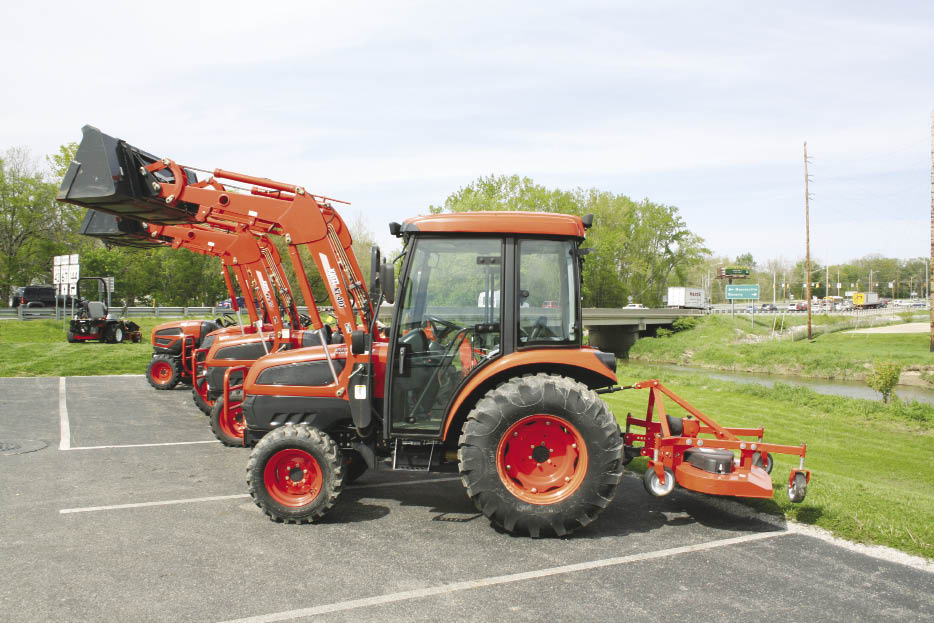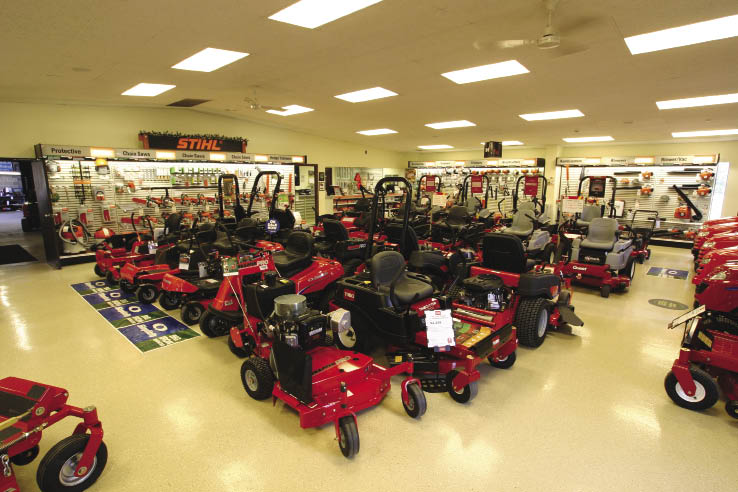Haltom Equipment
Location: Mooresville, Ind.
Founded: 1979 (merged in 2007, re-opened in 2010)
Employees: 4 full-time, 2 seasonal part-time
Shortlines: Kioti, Land Pride, Exmark, Toro, Simplicity/Snapper Pro, Snow-Ex, Stihl
Key employees: Scott Benko, owner/principal; Laura Benko, office manager; Bruce Kittle, parts/service.
Scott Benko gave his dealership a facelift during the winter of 2006. In the showroom, the bare concrete floor was treated to a beige epoxy finish. When he painted the walls and ceiling, he didn’t worry about getting overspray on the lights — the fixtures would be replaced to give the store a brighter, cleaner appearance.
Benko believed freshening up Haltom Equipment’s public face was essential to attracting the rural consumers and property owners who drove past the store. The demographics around the Mooresville, Ind., location were changing. With Indiana’s largest city less than a half-hour to the northeast and sprawling into the surrounding countryside, it was more likely that Haltom’s visitors were gardening on a few acres rather than farming on hundreds.
Haltom Equipment was in the middle of the renovation when a manufacturer’s dealer strategy got in the way of that work, as well as his thriving business. Haltom left, but Benko would eventually return. He finally replaced those over-sprayed lights three years later.
He says the new lights in the reopened Haltom Equipment store “really brightened things up.” That’s how he feels about being his own boss again, as well.
A Dealer Gets Merged
Since re-opening Haltom Equipment last year, Scott Benko is enjoying being his own boss. Benko is shown at left with parts/service manager Bruce Kittle and Laura Benko, office manager.

Since re-opening Haltom Equipment last year, Scott Benko is enjoying being his own boss. Benko is shown at left with parts/service manager Bruce Kittle and Laura Benko, office manager.
Haltom Equipment was founded in Mooresville in 1979. It was originally opened as a John Deere Consumer Products dealership that would take on the business that a local farm equipment dealer didn’t want because his farm equipment sales were so strong.
With other equipment brands available in addition to the green and yellow lawn tractors, Haltom had a wide range of products to offer to consumers and large property owners. Over the years, Haltom grew into a “very successful dealership,” says Benko.
Benko was working at another ag dealership when he and his wife, Laura, purchased Haltom in 1996, when the original owner, Lowell Haltom, retired. Under the Benko’s ownership, the business continued to grow for the next 10 years — it was a top 5 Dixon mower dealership for several years in a row. Benko employed as many as 15 people and had $4 million in gross sales.
“Things were going great until the fall of 2006, when Deere & Co. got into its merger plans for the ag dealer up the road and two others in the area,” he says. “The target was soon on our business.”
Haltom Equipment merged into Indy Tractor, a new company that initially had locations in Franklin, Mooresville and Lebanon, Ind. In March 2007, Benko moved his business and employees up the road three miles to the farm dealership, now known as Indy Tractor. The merger put Deere’s ag and consumer equipment under the same roof for the first time since 1979.
As a consumer equipment specialist in a big farm machinery dealership, Benko says he never really felt comfortable. Nor did he like the way consumers were sometimes treated when they showed up to buy a lawn mower or parts. “Most of the employees there wanted to deal only with farmers, and farmers were used to getting all the attention,” Benko says. “It wasn’t a good match by any means.”
One year later, Indy Tractor acquired a Deere Consumer Products dealer in Bloomington, Ind., and Benko was transferred to that store. Then, in June 2009, Benko learned the dealership’s majority owners wanted him out. He was unemployed.
Benko’s wife, Laura, had also moved to Indy Tractor. She worked at the Franklin store until February 2010.
“There are ups and downs in this business,” says Benko, “but that three-year period was definitely a downer. It didn’t go well at all.”
Life After Merger
“When I got out it was a relief, but there was also fear. I wondered, ‘now what am I

Haltom Equipment sells the Kioti tractor line.
going to do?’ But Indy Tractor paid me for a while, so I didn’t work for the rest of that year.”
Also a part-time firefighter and EMT, Benko put in more shifts at the local department and looked for ag-related jobs through Purdue University, his alma mater. He and his daughter also worked in Indiana State Fair’s Pioneer Village, which celebrates agricultural history. It’s something he’s always wanted to do but never had the time.
The more he thought about it, getting back into the equipment business made sense. The original Haltom Equipment building — with valuable exposure on a busy intersection along Highway 67 — was empty, and he retained the original business name. Plus, Benko felt he had a good sense of what worked and didn’t work when it came to selling equipment to consumers, landscapers and large property owners.
“Many consumers are intimidated by big farm equipment,” says Benko, “and some people like that their lawn mower is related to a big four-wheel-drive tractor. That may be more acceptable in a rural area, but it’s not in an urban setting. We are a half-hour from the center of Indianapolis and many of our customers have no farm background.”
In October 2009, Benko began working toward re-establishing Haltom Equipment as a shortline dealer, and opened the doors the following March. Returning to the original location with the same name was the key to making the venture work. “I didn’t lose any brand equity.”
Since opening, “many of my old customers have returned. Some of my regulars were die-hard Deere fans, and I know I can’t get all of them back.”
The loyal Deere fans who have returned to Haltom do so for parts and service on other machinery brands, or to buy small outdoor power equipment. For the former, that business has been climbing thanks to a parts manager who can find any component under the sun. For the latter, Benko ensures that the wall displays of hand-held equipment are always well-stocked and organized.
Shortlines for a Broader Business
Today’s Haltom Equipment offers more brands and types of equipment than it did during its previous life. In selecting brands to carry, Benko sought quality products, brand recognition and types of machines that were popular in the region. He also needed brands that didn’t already have strong representation in the area. Once the key products, such as zero-turn mowers, tractors and attachments were covered, he worked to fill gaps that existed in his product line.
“By taking on more shortlines and offering more services we can bring in a greater variety of customers, but you have to be careful to not take on too many,” he says. Haltom Equipment is the northernmost store of its type before Indianapolis.
As such, Benko strives to fulfill any equipment-related needs, even beyond what a typical rural lifestyler might be looking for. The dealership keeps an inventory of hydraulic oil for contractors working in the area, and recently added the ability to make hydraulic hoses.
“These days, I’m seeing a lot of rural consumers and residential customers come through those doors,” says Benko. “And we’re picking up more commercial accounts, of which Haltom had very few before. They are important to me because they buy a lot of parts and equipment. I try to help them out when I can, even giving them a loaner if needed.”
It can be a challenge to reach commercial landscapers and mowing operations. While some are operated like a business, complete with office hours, many are not. The decision makers return calls between jobs, if at all. Benko maintains a list of operators in the region and stays in constant contact with them. He reaches them through direct mail, using a combination of lists he buys and ones he’s developed.
Postcards were also used to tell the region that Haltom Equipment was back in business, as well as billboards, local radio spots and by personally calling past customers.
Benko prefers using billboards and radio ads over newspapers. “An ad on the radio will be played several times a day, and a billboard is seen by drivers every day. I buy spots on the local radio station. Big markets are more expensive and a lot of that air time would be wasted in the city.”
He also sees value in participating in local events such as horse shows and county fairs. “People get used to us being there. I really think the exposure helps. I may not get a sale at the fair that night, but down the road it’s worth it.”
Customer is King & Queen
This enclosed trailer works as a rolling billboard while hauling equipment for customers. Haltom Equipment also uses it to haul new machines to county fairs and other local events where it sets up a display.

This enclosed trailer works as a rolling billboard while hauling equipment for customers. Haltom Equipment also uses it to haul new machines to county fairs and other local events where it sets up a display.
For Benko, the period when Haltom Equipment was closed reinforced the value of being customer-focused. He makes a point of acknowledging every customer when he or she walks in the door, and then he gives them time to get comfortable with the array of equipment.
“We smile, we wave, we acknowledge everybody the same,” he says. His office is adjacent to the showroom floor, and after a few moments he will offer to help customers narrow their search for something that’s appropriate for their particular operation and budget.
Benko is proud that there is a higher percentage of women shopping at Haltom these days. The trick, he says, is to simply treat them like customers. “Many women don’t like going to a big farm equipment dealership. It’s not comfortable for them to stand behind farmers who are killing time at the counter like it’s a social club. They want to be recognized as a paying customer, as well.”
Of course, turning a visitor into a customer isn’t always as easy as saying hello. It takes a lot of effort. The staff also works to ensure the showroom and the restrooms are clean. It’s brightly lit and painted in soothing colors. Music drifts down from the overhead speakers.
The staff keeps the outside looking nice and hangs banners in front to promote equipment lines and sales specials. Benko ensures they are making good use of the highway frontage, and changes equipment displays often.
The extra effort seems to be working. Benko didn’t want to disclose actual sales dollars, but says he feels good about where sales have been, especially since he’s returning to the business in a poor economy and in a region that has been plagued by drought. Benko is on track to double last year’s sales.
He says comparing today’s numbers with the years leading up to the merger isn’t fair. “I know the business will take time to grow back. In terms of expenses and obligations, Haltom is totally different from what it was in 2006.”
Products of a Different Color
Visitors to Haltom Equipment are greeted with a friendly “hello” before being allowed some time to examine the zero-turn mowers, hand-held equipment and other products on display. Scott Benko works to ensure the showroom is clean, well-lit and welcoming to consumer and commercial customers.

Visitors to Haltom Equipment are greeted with a friendly “hello” before being allowed some time to examine the zero-turn mowers, hand-held equipment and other products on display. Scott Benko works to ensure the showroom is clean, well-lit and welcoming to consumer and commercial customers.
The learning curve going from a brand-specific dealer to a range of shortline equipment has not been difficult. When it comes down to it, “product is product and service is service,” he says. “Now the product’s just a different color.”
Being well-versed on the features and benefits of Haltom’s equipment offering and that of the competition is more important. Benko keeps competitor brochures handy and refers to them often.
Some rural consumers understand they need a tractor, but will admit they don’t know the difference between a 3-point hitch and a PTO. It takes time to educate consumers about the equipment and determine what model makes sense on their property. “The rural consumer often does just enough research to be confused by the time they show up at a dealership,” he says. “That’s when I go back to the sales literature, comparing specifications for other machines on the market to help them make an informed decision.”
Bruce Can Find It
Mass merchandisers have created a customer who shops on price alone. “We have a Lowes Home Improvement store two miles up the road, so our low-end lawn and garden equipment really doesn’t sell.”
Those consumers eventually realize they need a servicing dealer who can find parts and offer service. By offering multiple brands and services, Haltom attracts customers who own different equipment brands. They walk up to the counter looking for parts for lawn mowers and tractors Haltom offers today as well as machines that haven’t been manufactured for decades.
“We try to help the Big Box store customer find parts and get their machine running again. Unfortunately, some customers bring in light-duty, low-priced mowers that have been driven into the ground.”
It’s tough to turn that situation into a sale, as that customer is typically on a tight budget — which is most likely the reason they bought a low-priced, light-duty machine at a chain store to begin with.
Benko says his parts and service business has increased. Bruce Kittle, Haltom’s parts and service manager, is a antique tractor collector and has helped cultivate that portion of the service business. His own Farmall M often gets parked in front of the business to attract collectors or property owners who keep antiques working on their land.
Like any dealership, Haltom Equipment has lost sales to used tractors or competitive machines. “It can be difficult to make a sale, but it’s easy at the same time. It can also be fun, but not when you lose a deal. Sales that are cancelled due to a customer’s poor credit rating really sting.”
If they tell Benko they’ve had a bankruptcy he gets nervous. The sale will probably not go through. “I have lost many sales to bad credit, and a lot of them know there will be a problem, too. I think some folks come in here thinking a lesser-known brand will be easier on credit approvals. Our time is too valuable to be wasted like that. I screen them better these days. Even if I see red flags, I can’t turn their business down. We have to go through the motions and hope for the best.”
Dealer Takeaways
-
Treat all visitors, men and woman, rural or urban, with the same respect when they walk in the door.
-
Know your products, and be prepared to explain what a PTO is, or the differences in the front axle designs of Brand A and B.
-
Consumers are more likely to notice the cleanliness of your store before they see the machinery. Work to create a comfortable, organized environment.
Don't forget to check out this article's companion piece:
Been There, Done That: ATVs Won't Return to Showroom Floor
To read more articles from the Summer 2011 issue, click the links below:
Features
From the Field
Developing Consumer Loyalty
What Rural Lifestylers Want From You!
Getting to Know the Llama Enthusiasts
How To Sell: Skid Steers & Attachments
Compact, Strong and Looking for Work
Rural Lifestyle Influencers in the Digital World
Columns
Marketing Matters
Climate Change
This enclosed trailer works as a rolling billboard while hauling equipment for customers. Haltom Equipment also uses it to haul new machines to county fairs and other local events where it sets up a display.





Post a comment
Report Abusive Comment